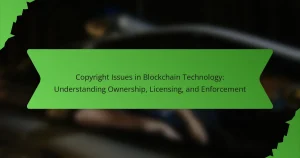Licensing agreements for crypto software are legal contracts that establish the terms for the use, modification, and distribution of software within the cryptocurrency ecosystem. This article explores the various types of licensing agreements, including proprietary, open-source, and dual licenses, highlighting their unique characteristics and purposes. Key clauses such as Grant of License, Ownership Rights, and Confidentiality are examined to clarify the rights and responsibilities of both licensors and licensees. Additionally, effective negotiation strategies are provided to help parties navigate the complexities of these agreements, ensuring compliance and maximizing the value of crypto software. Understanding these elements is essential for stakeholders in the crypto industry to protect intellectual property and foster innovation.

What are Licensing Agreements for Crypto Software?
Licensing agreements for crypto software are legal contracts that define the terms under which software can be used, modified, or distributed. These agreements specify the rights and responsibilities of both the licensor and the licensee. They ensure that the intellectual property of the software is protected while allowing users to leverage its capabilities. Common elements include usage rights, duration, fees, and restrictions on redistribution. Licensing agreements can vary widely, including open-source licenses, proprietary licenses, and hybrid models. Each type serves different purposes and audiences within the crypto ecosystem. Understanding these agreements is crucial for compliance and maximizing the value of crypto software.
How do Licensing Agreements function in the crypto software industry?
Licensing agreements in the crypto software industry allow developers to grant permission for the use of their software under specific terms. These agreements define the rights and responsibilities of both the licensor and the licensee. They often include clauses related to intellectual property rights, usage limitations, and payment structures. In the crypto space, licensing can cover various software types, including wallets, exchanges, and blockchain protocols. Compliance with regulations and standards is also a critical aspect of these agreements. For example, the MIT License is commonly used in open-source crypto projects, promoting collaboration while protecting the developer’s rights. Overall, licensing agreements are essential for establishing legal frameworks that govern the use of crypto software.
What are the key components of Licensing Agreements?
The key components of licensing agreements include the scope of the license, payment terms, duration, and termination clauses. The scope defines the rights granted to the licensee, such as usage limitations or geographical restrictions. Payment terms specify the fees and payment schedule for the license. Duration outlines the length of time the agreement is valid. Termination clauses detail the conditions under which either party can end the agreement. These components ensure clarity and protection for both parties involved in the licensing process.
How do these components impact software distribution?
Licensing agreements significantly impact software distribution by defining usage rights and restrictions. These agreements determine how software can be shared, modified, or sold. They establish legal frameworks that protect intellectual property. Clear licensing terms can enhance user trust and compliance. Conversely, vague or restrictive clauses may hinder adoption. Different license types, such as open-source or proprietary, influence market reach. For instance, open-source licenses encourage community collaboration. In contrast, proprietary licenses limit access and control. Effective negotiation of key clauses can optimize distribution strategies. This ensures alignment between developers and users, ultimately affecting software success in the market.
Why are Licensing Agreements important for crypto software developers?
Licensing agreements are crucial for crypto software developers as they define the legal framework for using, distributing, and modifying software. These agreements protect intellectual property rights, ensuring developers retain ownership of their innovations. They also establish terms for collaboration, which can enhance project funding and resource sharing. Furthermore, licensing agreements help mitigate risks associated with legal disputes by clearly outlining responsibilities and limitations. According to a report by the World Intellectual Property Organization, effective licensing can significantly increase a software’s market value and adoption rate.
What legal protections do Licensing Agreements provide?
Licensing agreements provide legal protections by defining the rights and responsibilities of both licensors and licensees. They establish the scope of use for the licensed material, ensuring that the licensee cannot misuse or distribute the material beyond agreed terms. Licensing agreements also protect intellectual property rights, preventing unauthorized use or infringement. They often include confidentiality clauses to safeguard sensitive information shared between parties. Additionally, these agreements typically outline dispute resolution mechanisms, offering a structured approach to handle conflicts. This legal framework supports compliance with applicable laws, reducing the risk of legal complications.
How do Licensing Agreements affect revenue models?
Licensing agreements significantly impact revenue models by establishing the terms under which intellectual property is utilized. These agreements can create multiple revenue streams through royalties, upfront fees, or profit-sharing arrangements. For example, a software company may license its technology to a partner for a percentage of sales, directly linking revenue to the agreement’s structure. Additionally, licensing can lead to market expansion, allowing companies to reach new customers and increase overall revenue. A study by the International Licensing Industry Merchandisers’ Association indicates that licensing can generate billions in revenue annually, highlighting its importance in diverse industries.

What are the different types of Licensing Agreements for Crypto Software?
The different types of licensing agreements for crypto software include proprietary licenses, open-source licenses, and dual licenses. Proprietary licenses grant exclusive rights to the software developer. Users must comply with specific terms and often pay fees. Open-source licenses allow users to access, modify, and distribute the software freely. This promotes collaboration and innovation. Dual licenses combine elements of both proprietary and open-source agreements. Developers can choose which license to apply based on user needs. Each type of agreement serves distinct purposes and offers various levels of access and control.
What are the main categories of Licensing Agreements?
The main categories of licensing agreements include exclusive, non-exclusive, sole, and cross-licensing agreements. Exclusive licensing agreements grant rights to one licensee, preventing the licensor from granting those rights to others. Non-exclusive agreements allow multiple licensees to use the same rights simultaneously. Sole licensing agreements provide rights to one licensee while allowing the licensor to retain the right to use those rights as well. Cross-licensing agreements involve two parties granting each other rights to their respective intellectual property. These categories help define the scope and limitations of rights granted in licensing agreements.
How do open-source licenses differ from proprietary licenses?
Open-source licenses allow users to freely use, modify, and distribute software. In contrast, proprietary licenses restrict access to the source code and limit user rights. Open-source licenses promote collaboration and innovation. They often require derivative works to remain open-source as well. Proprietary licenses protect the intellectual property of the creator. They typically involve fees and restrict redistribution. Examples of open-source licenses include the GNU General Public License and the MIT License. Proprietary licenses are commonly used by commercial software companies.
What are the implications of each license type?
The implications of each license type in crypto software vary significantly. Proprietary licenses restrict user access and modifications. These licenses protect the developer’s intellectual property. Open-source licenses allow users to modify and distribute the software. This promotes collaboration and innovation within the community. Commercial licenses typically require payment and offer support. They may limit the number of users or installations. Academic licenses often permit free use for educational purposes. They may require attribution to the original creator. Each license type influences user rights and responsibilities distinctly. Understanding these implications is crucial for compliance and strategic planning.
What are some common hybrid licensing models?
Common hybrid licensing models include dual licensing, open source with commercial options, and freemium models. Dual licensing allows users to choose between open source and proprietary licenses. Open source with commercial options provides free access to the software, with paid support or additional features. Freemium models offer basic functionality for free, with premium features available for a fee. These models enable flexibility and cater to different user needs while maximizing revenue potential.
How do hybrid models balance open-source and proprietary elements?
Hybrid models balance open-source and proprietary elements by integrating both types of software to leverage their strengths. They allow developers to use open-source components for flexibility and community support. At the same time, they protect proprietary elements to maintain competitive advantages. This model often involves licensing agreements that specify which parts are open-source and which are proprietary. For instance, a company may release a core product as open-source while keeping advanced features proprietary. This approach encourages collaboration while safeguarding intellectual property. Companies like Red Hat exemplify this model by offering open-source software with paid support and additional proprietary features.
What are the benefits of using a hybrid licensing approach?
A hybrid licensing approach combines elements of both proprietary and open-source licensing. This strategy allows for greater flexibility in software distribution. Companies can protect core intellectual property while benefiting from community contributions. It fosters innovation by allowing developers to build upon existing code. Additionally, a hybrid model can attract a wider user base. This approach can lead to improved security through community scrutiny. It also enables revenue generation through dual licensing options. Overall, a hybrid licensing approach balances control and collaboration effectively.

What key clauses should be included in Licensing Agreements for Crypto Software?
Key clauses in Licensing Agreements for Crypto Software include Grant of License, which defines the scope of use. Another important clause is Ownership Rights, clarifying the intellectual property status. The Term and Termination clause specifies the duration of the agreement and conditions for termination. A Confidentiality clause protects sensitive information shared between parties. The Indemnification clause outlines liability and protection against claims. The Governing Law clause establishes the legal jurisdiction for disputes. Lastly, a Warranty and Disclaimer clause addresses the software’s performance and limitations. These clauses ensure clarity and protection for both licensors and licensees.
What are the essential clauses in a Licensing Agreement?
Essential clauses in a Licensing Agreement include the scope of the license, payment terms, duration, and termination conditions. The scope of the license defines what rights are granted to the licensee. Payment terms specify the fees and payment schedule. Duration indicates how long the agreement is valid. Termination conditions outline the circumstances under which either party can end the agreement. Additionally, there may be clauses on intellectual property rights, confidentiality, and dispute resolution. These clauses ensure clarity and protect the interests of both parties involved in the agreement.
How do confidentiality clauses protect sensitive information?
Confidentiality clauses protect sensitive information by legally binding parties to keep specified information secret. These clauses outline what information is considered confidential and restrict its disclosure to unauthorized individuals. They create a legal obligation that can result in penalties for breaches. The presence of these clauses fosters trust between parties, encouraging open communication. They are commonly used in licensing agreements to safeguard proprietary technology and trade secrets. By defining the scope of confidentiality, these clauses minimize the risk of information leaks. Courts enforce these clauses, providing a legal remedy in case of violations. This legal backing ensures compliance and deters potential breaches.
What role do termination clauses play in Licensing Agreements?
Termination clauses in licensing agreements define the conditions under which the agreement can be ended. They provide clarity on rights and obligations upon termination. These clauses help protect the interests of both parties involved. They specify notice periods and potential penalties for early termination. Termination clauses also address the return or destruction of confidential information. They can outline the consequences of breach or non-compliance with the agreement. Clear termination clauses can prevent disputes and litigation. Thus, they play a crucial role in ensuring a smooth exit strategy for both licensors and licensees.
How can developers ensure compliance with Licensing Agreements?
Developers can ensure compliance with Licensing Agreements by thoroughly reviewing the terms and conditions. They should understand the specific rights and restrictions outlined in the agreement. Regular audits of software usage can help identify any potential violations. Developers must also maintain proper documentation of licenses and usage records. Training team members on compliance requirements is crucial. Engaging legal counsel for clarification on complex clauses can prevent misunderstandings. Staying updated on changes in licensing laws and regulations is essential. Utilizing compliance management tools can streamline the monitoring process.
What are the consequences of non-compliance?
Non-compliance with licensing agreements for crypto software can lead to significant legal and financial consequences. Organizations may face lawsuits or legal actions from licensors seeking damages. Financial penalties can include hefty fines or the obligation to pay royalties retroactively. Non-compliance may also result in the revocation of the license, leading to a cessation of software use. This can disrupt operations and lead to loss of revenue. In some cases, reputational damage may occur, affecting relationships with partners and customers. Furthermore, regulatory authorities may impose additional sanctions if applicable laws are violated. These consequences underline the importance of adhering to licensing terms.
How can monitoring mechanisms be implemented effectively?
Effective monitoring mechanisms can be implemented through structured processes and tools. Establish clear objectives for what needs monitoring. Utilize software tools that automate data collection and analysis. Regularly review and update monitoring criteria based on evolving needs. Train personnel on the importance and use of monitoring systems. Ensure compliance with legal and regulatory standards during implementation. Conduct periodic audits to assess the effectiveness of the monitoring mechanisms. These practices enhance oversight and ensure adherence to licensing agreements in crypto software.

What are effective negotiation tips for Licensing Agreements in the crypto sector?
Effective negotiation tips for licensing agreements in the crypto sector include thorough preparation and understanding of the technology involved. Research the market value of similar licenses to establish a benchmark. Clearly define the scope of use and any limitations to avoid misunderstandings. Prioritize essential terms such as royalties, duration, and termination clauses. Foster open communication to build trust between parties. Consider involving legal experts with experience in crypto to navigate complex regulations. Document all agreements meticulously to ensure clarity and enforceability. These strategies help create mutually beneficial agreements that align with industry standards.
What strategies can be employed during negotiations?
Effective negotiation strategies include preparation, active listening, and establishing clear objectives. Preparation involves researching the other party’s needs and interests. Active listening ensures understanding and fosters trust. Establishing clear objectives helps to focus the negotiation process. Additionally, employing a win-win approach can create mutually beneficial outcomes. Flexibility in tactics allows for adaptation during discussions. Building rapport with the other party enhances collaboration. Finally, using objective criteria can guide decisions and facilitate agreement. These strategies are vital in licensing agreements for crypto software, where clarity and mutual understanding are essential for success.
How can developers prepare for negotiations effectively?
Developers can prepare for negotiations effectively by conducting thorough research on the other party’s needs and objectives. Understanding the market value of their software is crucial. Developers should also define their own goals and limits before entering negotiations. Creating a list of key points to address helps maintain focus during discussions. Practicing negotiation scenarios with colleagues can enhance confidence and communication skills. Familiarity with relevant legal terms and licensing clauses is essential for informed discussions. Finally, being open to compromise while remaining firm on critical issues can lead to successful outcomes.
What common pitfalls should be avoided during negotiations?
Common pitfalls during negotiations include lack of preparation and poor communication. Negotiators should thoroughly research the other party’s interests and needs. Failing to do so can lead to misunderstandings and missed opportunities. Additionally, not establishing clear objectives can result in aimless discussions. It is crucial to set specific goals before entering negotiations. Another pitfall is allowing emotions to overshadow logic. Emotional reactions can derail productive conversations. Furthermore, being inflexible can hinder reaching a mutually beneficial agreement. Successful negotiators must be willing to compromise. Not listening actively to the other party can also create barriers. Effective negotiation requires understanding the other party’s perspective. Lastly, neglecting to document agreements can lead to disputes later. Clear records help ensure all parties are aligned on the terms.
What resources can assist in the negotiation process?
Negotiation resources include legal templates, industry guidelines, and expert consultations. Legal templates provide standardized frameworks for drafting agreements. Industry guidelines offer best practices specific to crypto software licensing. Expert consultations involve reaching out to professionals with negotiation experience. These resources help ensure that all key clauses are addressed. They also support effective communication between parties. Utilizing these resources can lead to more favorable outcomes.
How can legal counsel contribute to successful negotiations?
Legal counsel can significantly enhance successful negotiations by providing expert guidance on legal frameworks. They help identify key legal issues that may arise during negotiations. This expertise ensures compliance with relevant laws and regulations. Legal counsel also assists in drafting clear and enforceable agreements. Their involvement can prevent misunderstandings and disputes later on. Furthermore, they offer strategic advice on negotiation tactics and positions. Their insights can lead to more favorable terms for their clients. Overall, legal counsel plays a critical role in facilitating effective communication and negotiation outcomes.
What tools or platforms can facilitate the negotiation process?
Collaboration tools and platforms can facilitate the negotiation process. Examples include video conferencing software like Zoom and Microsoft Teams. These platforms allow real-time discussions and visual presentations. Document sharing services such as Google Drive and Dropbox enable easy access to negotiation documents. E-signature solutions like DocuSign streamline the signing process. Project management tools like Trello or Asana help track negotiation progress. These tools enhance communication and organization, leading to more efficient negotiations.
What are best practices for drafting Licensing Agreements?
Best practices for drafting licensing agreements include clear definitions of terms and conditions. Define the scope of the license, including permitted uses and restrictions. Specify the duration of the agreement and renewal terms. Include payment terms and any royalties or fees involved. Address intellectual property rights and ownership clearly. Outline dispute resolution mechanisms to handle conflicts. Ensure compliance with relevant laws and regulations. Review the agreement regularly to adapt to changes in technology or law.
How can clarity and specificity enhance the agreement’s effectiveness?
Clarity and specificity enhance an agreement’s effectiveness by reducing ambiguity. Clear terms prevent misunderstandings between parties. Specific details outline each party’s responsibilities and rights. This precision fosters trust and cooperation. It also facilitates easier enforcement of the agreement’s terms. According to a study by the American Bar Association, well-defined contracts significantly lower the risk of disputes. Therefore, clarity and specificity are critical for successful licensing agreements in crypto software.
What role does feedback play in refining Licensing Agreements?
Feedback plays a critical role in refining Licensing Agreements. It allows parties to identify areas for improvement and clarify terms. Constructive feedback helps in addressing ambiguities and misunderstandings in the agreement. This iterative process enhances the accuracy of terms and conditions. Regular feedback can lead to better alignment of expectations between licensors and licensees. It also fosters stronger relationships and trust among parties involved. In the context of crypto software, feedback can address unique regulatory and technological challenges. Ultimately, effective feedback mechanisms contribute to more robust and enforceable agreements.
Licensing agreements for crypto software are legal contracts that outline the terms for using, modifying, and distributing software within the cryptocurrency ecosystem. This article covers the various types of licensing agreements, including proprietary, open-source, and hybrid models, along with their key components such as usage rights, payment terms, and termination clauses. It highlights the importance of these agreements for developers in protecting intellectual property, ensuring compliance, and optimizing revenue models. Additionally, effective negotiation strategies and best practices for drafting clear and enforceable agreements are discussed, providing essential insights for stakeholders in the crypto software industry.




